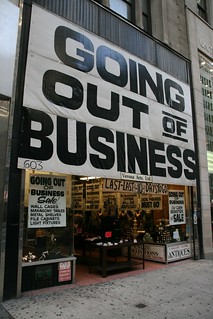
A belief that most every America holds is that with hard work, determination and a little luck, anyone can be successful. And this is true. American history is full of successful men and women who rose from rags to riches, who built great companies and amassed great fortunes through their iron will, their smarts, and their ability to do something a little bit better than their competitors could do.
This is a good thing. So don’t take it the wrong way when I share some facts with you that take a little of the shine off the apple when it comes to success stories. No one (that I know of) keeps official statistics of entrepreneurs who realize their dreams and those who don’t, so most of what I’m going to tell you is anecdotal.
Entrepreneurial Facts
Fact #1: Most entrepreneurs fail.
Even the successful ones fail. Take Thomas Chippendale, history’s most famous furniture designers. While Thomas Chippendale’s furniture was the rage in England for a good part of the 18th century, he died broke and his designs were mocked as “yesterday’s news” by his competitors. Today, his furniture sells for millions of dollars and only a few hundred authentic Chippendale pieces exist.
 Fact #2: Many entrepreneurs borrow someone else’s idea.
Fact #2: Many entrepreneurs borrow someone else’s idea.
History is full of examples of this; for example, take Thomas Edison, whom many credit with being a so-so inventor but a great marketer of other people’s ideas. His estate was worth nearly $200 million in today’s dollars. On the other hand, Edison’s contemporary and employee, Nikola Tesla, whom many believe was the superior inventor, died (you guessed it) broke and somewhat deranged.
Fact #3: Many entrepreneurs are just lucky.
The man who invented the Post-It Note was actually trying to invent a super-strong adhesive; he ended up doing just the opposite. “Super Glue” was an accident, as was Teflon, the Slinky, and saccharin. In every case, the creator was trying to accomplish something else and often didn’t see any use for the accidents they created.
Fact #4: Many entrepreneurs are just unlucky.
Have you heard economists speak of “macro forces”? These are the big happenings in the economy that entrepreneurs just can’t control, similar to the weather. Sometimes an entrepreneur brings a great product to market, but the macro forces aren’t lined up correctly: the stock market is down and people aren’t buying, unemployment is up and people aren’t buying, and so on.
So does being a successful entrepreneur come down to chance? Do you need to steal an idea, or stumble across one, and hope that the stars are lined up correctly? Sometimes. But I think there are two other facts that should give hope to every entrepreneur out there:

-Thomas Jefferson
Fact #5. Your odds of winning increase greatly if you play the game.
You can’t be a successful entrepreneur if you don’t try. Success requires planning, innovation, execution and leadership. While success is not guaranteed, failure is a certainty if you don’t even put forth an effort.
Fact #6. The harder you work, the luckier you get.
Sometimes success is all about being in a position to take advantage of it when it comes knocking. People who continually try new things often create their own opportunities.
There you have it. It’s a rough business world. In a market-driven economy, you will always have winners and losers. But I think if you ignore facts 1-4 and focus on 5 and 6, you’ll not only be more successful, but probably a little happier, too.
